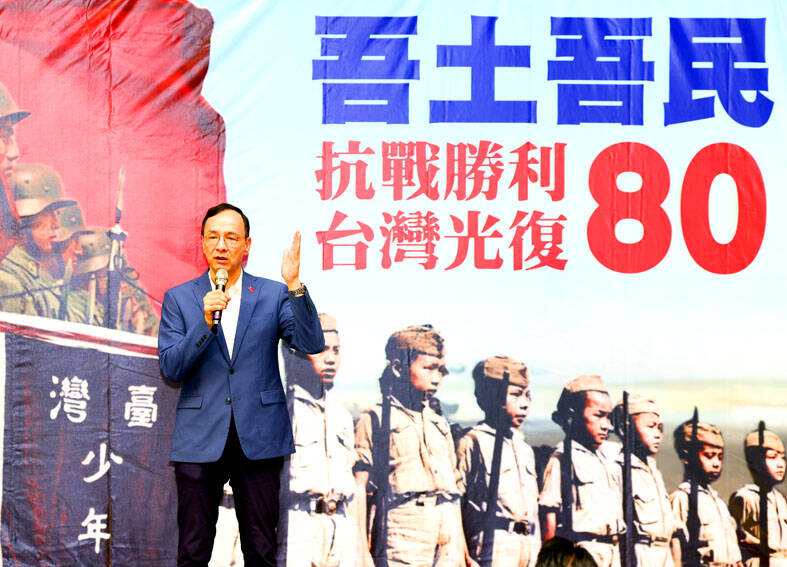Former president Ma Ying-jeou (馬英九) yesterday criticized President William Lai (賴清德) over what he called “phrasing that downplayed Japan’s atrocities” against China during World War II.
Ma made the remarks in a post on Facebook on the 80th anniversary of the end of World War II.
Ma said he was “angry and disappointed” that Lai described the anniversary as the end of World War II instead of a “victory in the war of resistance” — a reference to the end of the Second Sino-Japanese War (1937-1945).

Photo: Taipei Times
The eight-year war was a part of World War II, in which Japan and the other Axis powers were defeated by the Allies. Taiwan was part of Japan from 1895, following the Treaty of Shimonoseki signed with the Qing Empire, until Japan’s defeat in World War II in 1945.
Forgetting the humiliations and sacrifices of “the people of the Republic [of China]” experienced in a gesture of “obsequity to Japan” disqualified Lai from being the Republic of China’s (ROC) president, Ma said yesterday.
Ma said he on Thursday urged Lai to stop ignoring the issue of comfort women to placate Japan, but did not anticipate that Lai would distort World War II history by emphasizing the war in Europe at the expense of the war in China, he said.

Photo: CNA
Lai’s “distortion and mutilation of history committed in the service of kowtowing to Japan pains the heart,” Ma said.
“As members of the Zhonghua minzu [中華民族, Chinese ethnic group], we must not allow Japan’s savage invasion of China — which led to numerous deaths among the people of the Republic [of China] — to be erased, distorted, forgotten or downplayed,” he said.
Lai should be reminded of the people who lost their lives resisting Japan during the eight years of war, including Taiwanese who died resisting Japanese colonialism, he added.
Separately, Chinese Nationalist Party (KMT) Chairman Eric Chu (朱立倫) yesterday attended an exhibition marking the anniversary of “victory in the war of resistance and Taiwan’s liberation.”
Taiwanese must be grateful for their forebears’ contribution to democracy, peace and prosperity during World War II, Chu said.
“Chiang Kai-shek (蔣介石) and the KMT’s leadership during eight years of war made the liberation of Taiwan and the good times we enjoy today possible,” he said.
The Cairo Declaration in 1943 and Potsdam Declaration in 1945 specified the return of Taiwan proper and Penghu to the ROC, he added.
The KMT’s interpretation of the Cairo Declaration as the legal basis for Taiwan’s “return” to the ROC after World War II has long been challenged by academics, who say the Treaty of San Francisco signed on Sept. 8, 1951, was the only legal document to determine Taiwan’s status.

Taiwan has received more than US$70 million in royalties as of the end of last year from developing the F-16V jet as countries worldwide purchase or upgrade to this popular model, government and military officials said on Saturday. Taiwan funded the development of the F-16V jet and ended up the sole investor as other countries withdrew from the program. Now the F-16V is increasingly popular and countries must pay Taiwan a percentage in royalties when they purchase new F-16V aircraft or upgrade older F-16 models. The next five years are expected to be the peak for these royalties, with Taiwan potentially earning

POSITIVE DEVELOPMENT: Japan and the US are expected to hold in-depth discussions on Taiwan-related issues during the meeting next month, Japanese sources said The holding of a Japan-US leaders’ meeting ahead of US President Donald Trump’s visit to China is positive news for Taiwan, former Japan-Taiwan Exchange Association representative Hiroyasu Izumi said yesterday. After the Liberal Democratic Party’s landslide victory in Japan’s House of Representatives election, Japanese Prime Minister Sanae Takaichi is scheduled to visit the US next month, where she is to meet with Trump ahead of the US president’s planned visit to China from March 31 to April 2 for a meeting with Chinese President Xi Jinping (習近平). Japan and the US are expected to hold in-depth discussions on Taiwan-related issues during the

‘LIKE-MINDED PARTNER’: Tako van Popta said it would be inappropriate to delay signing the deal with Taiwan because of China, adding he would promote the issue Canadian senators have stressed Taiwan’s importance for international trade and expressed enthusiasm for ensuring the Taiwan-Canada trade cooperation framework agreement is implemented this year. Representative to Canada Harry Tseng (曾厚仁) in an interview with the Central News Agency (CNA) said he was increasingly uneasy about Ottawa’s delays in signing the agreement, especially as Ottawa has warmed toward Beijing. There are “no negotiations left. Not only [is it] initialed, we have three versions of the text ready: English, French and Mandarin,” Tseng said. “That tells you how close we are to the final signature.” Tseng said that he hoped Canadian Prime Minister Mark Carney

STAY IN YOUR LANE: As the US and Israel attack Iran, the ministry has warned China not to overstep by including Taiwanese citizens in its evacuation orders The Ministry of Foreign Affairs (MOFA) yesterday rebuked a statement by China’s embassy in Israel that it would evacuate Taiwanese holders of Chinese travel documents from Israel amid the latter’s escalating conflict with Iran. Tensions have risen across the Middle East in the wake of US and Israeli airstrikes on Iran beginning Saturday. China subsequently issued an evacuation notice for its citizens. In a news release, the Chinese embassy in Israel said holders of “Taiwan compatriot permits (台胞證)” issued to Taiwanese nationals by Chinese authorities for travel to China — could register for evacuation to Egypt. In Taipei, the ministry yesterday said Taiwan